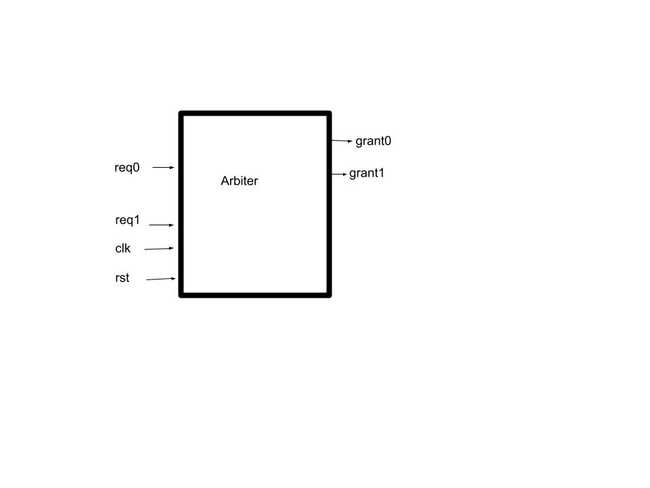Verification
Verification plan of a simple arbiter
Verification plan of a simple arbiter
Coding Scenario
Question
---
Q2: Develop a verification plan for the following arbiter
---Arbiter

**Description**
Above diagram shows the block diagram of an arbiter that controls 2 requesting agents and generates 2 grants to each of the agent in a round robin order.
**Specification**
Assume that each of the requesting agent can assert the request signal (Req 0/1) independently and will hold it asserted until the arbiter gives them grant for a pulse. The arbitration order is Req0 followed by 1 in a round robin fashion. Given that there are 2 requesting agents, each of them should get a grant at least once in 2 cycles. This also means that if a request is asserted, the grant signal for that agent should be assigned in a maximum of 2 cycles. Following things can be verified with assertion-
1) In any cycle, there can be only one grant signal that can be asserted.
2) Each requesting agent should get a grant signal in a maximum 2 cycle window.
3) If one requesting agent gets a grant, it cannot receive another grant unless no other agent is requesting.
4) If there are no requests, there cannot be any grants asserted
5) If not in reset, none of the grants should go to unknown. ---
Q) Write a assertion to check that arbiter should assert one of the grants at given time or no grants at all in given time
---only_1_grant : assert ( $isonehot0({grant1, grant2, grant3, ...}) )
else
begin
$error("...");
end---
Q) Write a checker to check If not in reset, none of the grants should go to unknown
---always@(posedge clk)
begin///
if(!reset)begin//
grant_not_unknown : assert ( not( $isunknown({grant1, grant2, grant3, ...}) ) )
else begin
$error("going to X/Z");
end
end//
end///Stretch question on above
---
Q2.1: Write a checker to check that if 1 request is asserted another request should not be asserted in the next clock cycle but can come any time after. i.e., back to back request not possible.
---//Make the forbidden sequence
//Method 1
sequence req0_b2b;
@(posedge clk)
req0 |->##1 req0;
endsequence
property p_req0_b2b;
not seq;
endproperty
req0_b2b_chk: assert property(p_req0_b2b);
//It means that above sequence will never happen.
//If it happens, property fails
sequence req1_b2b;
@(posedge clk)
req1 |->##1 req1;
endsequence
property p_req1_b2b;
not seq;
endproperty
req1_b2b_chk: assert property(p_req1_b2b);
//It means that above sequence will never happen.
//If it happens, property fails//Method 2
property req0_b2b;
@(posedge clk)
req0 |-> ($past(req0,1)==1'b0); //In the previous cycle it cannot go high
endproperty
req0_b2b_chk : assert property (req0_b2b);
//Similarly for req1 ....Stretch question on above
---
Q2.2 Write a checker to check that if request is asserted, then grant should be asserted in the next clock or in the next to next clock (2 cycle window)
---property req0_followed_by_grant0;
@(posedge clk) req0 |-> ##[1:2]grant0 ;
endproperty: req0_followed_by_grant0
chk0 : assert property (req0_followed_by_grant0);
property req1_followed_by_grant1;
@(posedge clk) req1 |-> ##[1:2]grant1 ;
endproperty: req1_followed_by_grant1
chk1 : assert property (req1_followed_by_grant1);Question 3
---
Q3: Write an assertion/checker to catch the following cases-
a) Check if count variable increments everytime signal valid is set
b) write_data should be stable until write_ack arrives
c) If valid is asserted, it should remain high until ready is received
---//a
property p_a;
@(posedge clk)
valid |-> count == ($past(count)+1);
endproperty
p_a_chk: assert property (p_a);//b
property p_b;
@(posedge clk)
(wr && !wr_ack) // wr is on but wrdata is not yet acked
|-> ##1 (write_data == $past(write_data)); //write data should be stable
endproperty
p_b_chk: assert property (p_b);property p_c;
@(posedge clk)
(valid && !ready)
|-> ##1 valid throughout (ready[->1]); //because valid can get deasserted only after ready comes, so check for high valid until ready comes
endproperty
p_c_chk: assert property (p_c);Question 4
---
Write a SV test/checker to detect if all the clocks on the SOC have been switched off after writing 1'b1 to a register
---**Assumptions**
- There are clocks clk1, clk2, clk3, clk4 in design and the reference or top master/sampling clock is ref_clk
- Register/signal is "a" to where we need to write 1'b1 to make them off
- After writing 1'b1 to register "a", all the clocks are deasserted after a maximum stabilising time say #5 simulation timeunits;module clk_off;
bit a;
bit clk1, clk2, clk3, clk4;
bit ref_clk;
event write_to_reg_a;
always@(posedge ref_clk)
begin//
if(a)begin
#5;
-> write_to_reg_a;
end
end//
property clk_off_p;
@(posedge ref_clk)
$rose(a) -> @write_to_reg_a (!clk1 && !clk2 && !clk3 && !clk4 && !ref_clk)
endproperty:chk_off_p
clk_off_chk: assert_property(clk_off_p);
endmodule: clk_off